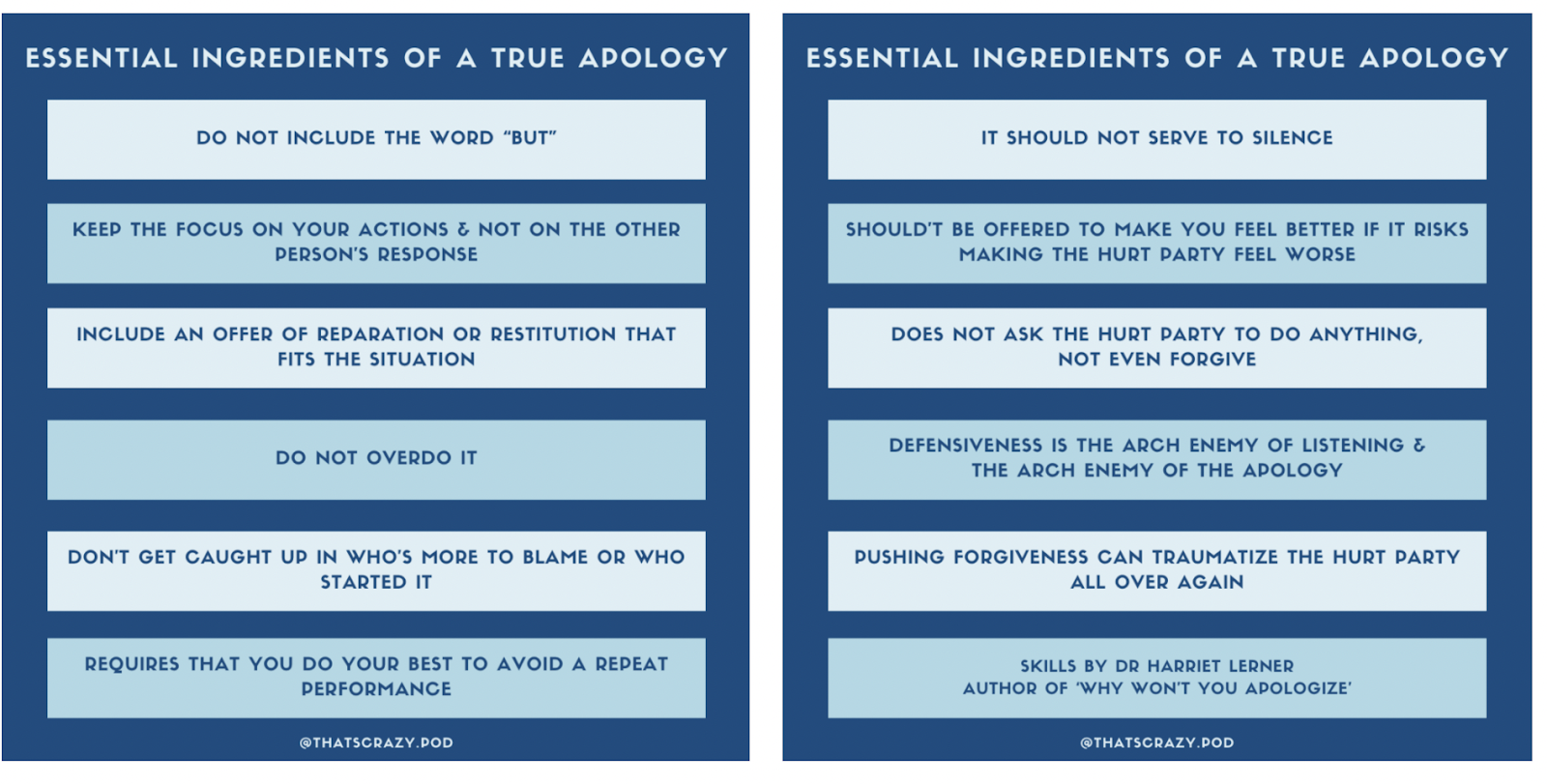Do you know how to apologize meaningfully when you have made a mistake or hurt someone — intentionally or unintentionally? Most of us growing up did not see good models of healthy apologies to repair ruptures and restore relational trust and safety. Some of us were forced to say we were sorry when we weren’t. Yet others of us were taught that “I’m sorry” is a sign of inadequacy and weakness. Many of us women have been trained to be chronic over-apologizers. So it makes sense that we may need some guidance in the fine art of apologizing well.
The art of the apology
An excellent guide in learning about apologies is world-renowned psychologist Dr. Harriet Lerner who wrote the book Why Won’t You Apologize? Healing Big Betrayals and Everyday Hurts. You can also watch her engaging TedTalk or listen to her on Brené Brown’s podcast Unlocking Us.
These are Lerner’s 9 essential ingredients of a true apology.

If, like me, you are a little overwhelmed by 9 items, here are my top 3 tips:
- Listen. Really listen.
Our ability to listen without defensiveness is at the heart of a sincere apology. It takes openness and humility to suspend your need to be right in order to be fully present to the other’s reality. In the world of Imago therapy, we use the image of crossing the bridge into the other person’s world to see with fresh eyes. Leave your world. Stay curious and open.
- Validate the other’s perspective.
Validating means recognizing that the other person’s perspective makes sense (even if you don’t agree with it completely or don’t see it exactly the same way). Learn to say these three magic words: “you make sense.” They can make all the difference! As Lerner says, “It’s not the words ‘I’m sorry’ that heal or soothe the harmed party. What the harmed party wants and needs to hear is an emotionally packed corroboration of the reality that occurred: ‘Yes, I get it. It was terrible. Your feelings make sense.’ “
- Take 100% responsibility for your part.
This takes courage. It takes even more courage to own it without adding any “buts.” “I’m sorry but…” nullifies the apology because the focus is on justifying your action. “Humans are wired for defensiveness,” Lerner says. “And it’s very hard for us to take clear and direct responsibility for specific things we have said or done — or not said or done –without a hint of blaming, obfuscation, excuse-making [or] bringing up the other person’s crime sheet.”
What is your apology language?
Another wise guide in the skill of apologies is Gary Chapman, author of the well-known 5 Love Languages framework. According to Chapman, there are also five languages of apology, and we all receive the most sincere apology when one primary language is spoken.
To learn more, take the quiz and watch the first 5 minutes of Shan Boodram’s lively video.
Here are Chapman’s 5 apology languages with an example of each. See which ones resonate most for you and for your loved ones!
- Expressing regret – “I am sorry”
I apologize for ignoring what you were saying; I wish I’d been a better listener.
- Accepting responsibility – “I was wrong”
I’m sorry I spaced out while navigating. That was my fault.
- Making restitution – “What can I do to make it right?”
I’m sorry I forgot your birthday. I’d love to take you out to dinner and make it up to you.
- Genuinely repenting – “I’ll try not to do that again”
I know that when I yell like that, I’m repeating patterns I learned as a kid, but I don’t want to treat you like that. I need to work on finding better outlets for my anger so I don’t upset you.
- Requesting forgiveness – “Will you please forgive me?”
I know that there’s no excuse for the way I betrayed your trust, but I’m doing my best to be worthy of it now. Can you ever forgive me?
It’s all about repair
A relationship always involves two imperfect humans capable of communicating and behaving poorly at times and causing each other pain. Knowing how to repair those hurts when they happen is an important relationship task, and apologies are a key practice to help restore trust, integrity, and connection. Seize the opportunity today to learn how to say you’re sorry in a conscious way that will help you feel more connected to all the people you love.
Learn more about ways to connect and communicate in a Getting the Love You Want workshop.

